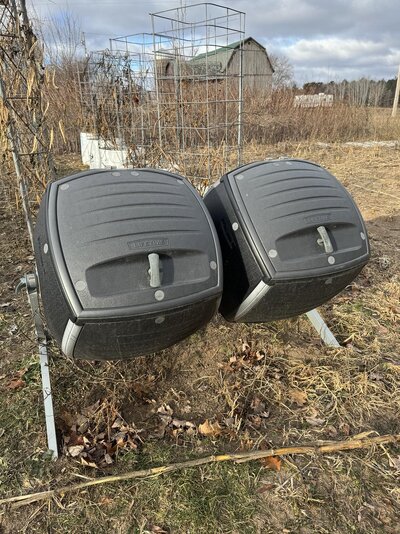I have a garden and now I have chickens. The coop has a poop board with PDZ/sand that I scoop poop from into a 5 gallon bucket every day. I'd like to start composting the chicken's poop to help enrich my garden.
As we live next to a steep wooded embankment, in the past all of our garden and yard waste would just get dumped over the side of that, so I dont have a dedicated compost pile.
I'd like to do this the easiest way possible so cold composting works for me, and I have a clear spot next to my chicken coop but outside of the run that I can build up some low walls with some left over cinderblocks.
I'd basically just be dumping yard waste, veg scraps, and chicken poop into a big pile.
Any reason to worry about the chickens possibly getting into it, especially with possible piles of grass clippings? They're penned in their run most of the time, but I let them out for supervised free range time if I'm out doing work around the coop.
As we live next to a steep wooded embankment, in the past all of our garden and yard waste would just get dumped over the side of that, so I dont have a dedicated compost pile.
I'd like to do this the easiest way possible so cold composting works for me, and I have a clear spot next to my chicken coop but outside of the run that I can build up some low walls with some left over cinderblocks.
I'd basically just be dumping yard waste, veg scraps, and chicken poop into a big pile.
Any reason to worry about the chickens possibly getting into it, especially with possible piles of grass clippings? They're penned in their run most of the time, but I let them out for supervised free range time if I'm out doing work around the coop.


 Yes, I used to have a beautiful grass filled chicken run - for about 3 months - but the chickens ripped out all the grass down to bare dirt. At that point, I started dumping wood chips into the run to keep it from getting all muddy when it rained. You can see I even built a pallet wood compost bin inside the chicken run. But I soon just converted the entire chicken into a composting system. I have never looked back since then.
Yes, I used to have a beautiful grass filled chicken run - for about 3 months - but the chickens ripped out all the grass down to bare dirt. At that point, I started dumping wood chips into the run to keep it from getting all muddy when it rained. You can see I even built a pallet wood compost bin inside the chicken run. But I soon just converted the entire chicken into a composting system. I have never looked back since then. For years and years, I got by with a manual compost sifter made out of 2X4's and hardware cloth. No complaints, but it was a lot of hard work sifting compost manually and it would take me a longer time to make a wagon full of sifted compost. But you don't need to invest in anything else to make great sifted compost.
For years and years, I got by with a manual compost sifter made out of 2X4's and hardware cloth. No complaints, but it was a lot of hard work sifting compost manually and it would take me a longer time to make a wagon full of sifted compost. But you don't need to invest in anything else to make great sifted compost.

 Those composting bins look brand new. Very nice.
Those composting bins look brand new. Very nice.